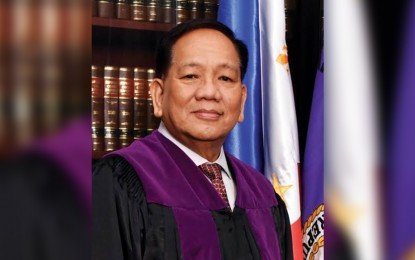
Chief Justice Diosdado Peralta. (File photo from SC)
MANILA – The country's top magistrate has questioned the contention of petitioners against the Anti-Terrorism Act (ATA) of 2020 claiming the vagueness of the definition of offenses covered by the law.
During Tuesday's oral arguments at the Supreme Court (SC), Chief Justice Diosdado Peralta said Section 4 and paragraphs (a), (b) and (c) of the law are not really unique insofar as it penalizes what may appear to be "preparatory" intended acts of terrorism.
In interpellating lawyer Jose Manuel Diokno, he noted that even before the passage of the law, criminalizing “preparatory” acts is covered in some laws.
Among offenses that may be prosecuted, Peralta said, even in the preparatory stage include "proposals to commit a crime of rebellion, conspiracy to commit the crime of sedition and proposal and conspiracy to commit rebellion, treason, and coup d' etat".
“These (penalizing preparatory acts) are not new. These acts were already there since 1932 when the Revised Penal Code was crafted. So, if the Anti Terrorism Law now provides preparatory acts as crimes, are these provisions now void?" Peralta said.
Three of the five enumerations being questioned in Section 4 of the ATA define terrorism as being committed by persons who, among other things, engages in acts intended to cause death or serious bodily injury or endangers a person’s life, cause extensive damage or destruction to a government or public facility, public place or private property, or cause extensive interference with damage or destruction to critical infrastructure.
“What is vague and void under these enumerations?,” Peralta asked Diokno.
Peralta added that it seemed the new law prevents a situation where an actual incident of a predicate crime such as murder or must actually occur before a crime of terrorism is considered committed.
“Patayan muna bago (There must be somebody who must be killed first before) terrorism,” the head magistrate said, describing the previous situation prior to the new law, adding “it would seem from predicate crimes must first be committed before they can be covered and considered as terrorist acts".
Peralta, along with Associate Justice Amy Lazaro-Javier, in interpellating Diokno and Albay Rep. Edcel Lagman, also questioned the opposition to provisions in the ATA that allows detention of up to 24 days.
Lazaro-Javier, meanwhile, pointed out that the provision under the Revised Penal Code on the deadline that an individual must be brought to judicial authorities after his arrest has changed throughout the years from “as soon as possible” to one hour to six hours to one day to up to anywhere from 12 to 36 hours depending on the gravity of the offense.
She opined that the provision affected by the ATA, Article 125 of the Revised Penal Code which penalizing undue delay in the delivery of arrested persons, may be considered” a work of progress” and jested whether the petitioners would expect the deadlines “will stay like that forever.”
“Do you agree that our laws have also evolved to cope up with the present time to reflect our experiences where previous experiences would no longer be practical?,” Javier asked Diokno.
Peralta, meanwhile, said the original deadlines on the period of detention were drafted when the population of the country was still very small compared to the present.
Peralta also added that “the experience is that cases are filed hastily because of this restrictive (period)”. (PNA)
